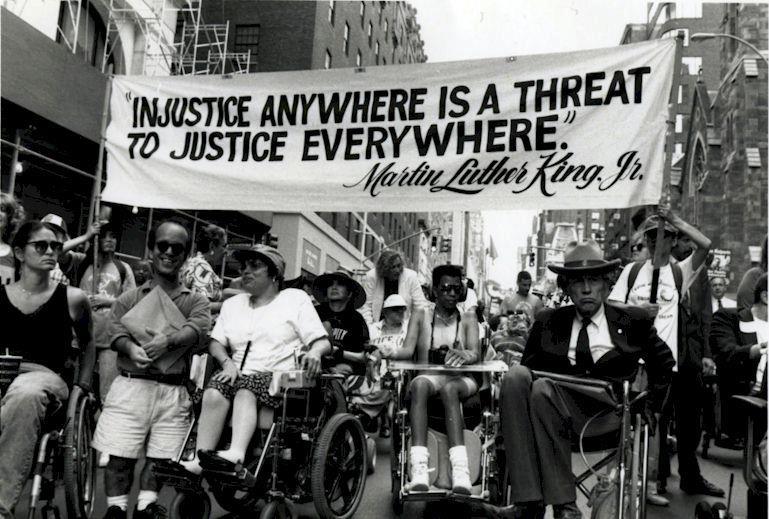Idiosyncratic Interconnections
Little Richard on an effeminate manner canceling out racism and workplace dynamics for gay black men today
In this ^^ Sally Jesse Raphael interview with Little Richard, Sally Jesse refers to the “sociological” quirk that activist, web journalist, and hip-hopper Yitz Jordan (Y-LOVE) mentioned—and backed up with studies & statistics—on WNYC’s The Brian Lehrer Show, hear that July 2014 segment here…the reality that gay black men or black men perceived as effeminate are seen as less of a threat and more readily accepted for jobs.
In his exhaustively-well-researched Quartz feature, Yitz points out new survey results by “Princeton University sociologist David Pedulla,” “in Social Psychology Quarterly,” that proved for black male applicants, “coming out on your resume,” for example listing gay student organization membership, volunteer history with LGBT nonprofits, etc., “effectively cancelled out” negative stereotypes of black men due to “the feminine stereotype” of gay men. And as Yitz noted in the WNYC interview: these are two ugly and wrong stereotypes colliding, black men who’re gay might not be more effeminate or less of a so-called “threat” even—see Omar in The Wire, or, y’know, look outside and simply observe the staggering infinite diversity around you—and making goofy, ham-fisted blanket assumptions of broad human groups like these will inevitably offend and dis many individuals.
But, it being the second decade of the 21st century notwithstanding, hiring managers change their decisions predictably based on old-ass, hackneyed stereotypes and good ol’ fashioned racism, and their biases are so ingrained and foreseeable, applicants can game them to their advantage (ala “game theory”). Dr. Pedulla’s results quantify the effects in hard numbers and bar graphs; survey responses even suggest “that for black male applicants, coming out may actually result in a higher starting salary.”
Interconnection: Little Richard
What is shocking is that, according to Little Richard, this loophole or “canceling out” of reflexive distrust and anxieties held true even during the ugliest segregation… including in white night clubs in the early 1950s Deep South. The flamboyant costumes were an asset: he noticed rockin’ the full face-cake-makeup, mascara mustache and cape opened doors and allowed him to get gigs no other black man could.
Bull Connor-type night club owners be like COME ON IN… according to L.R., they’d let him in even when making his brothers and bandmates wait outside.
Fascinating loop-hole in the fear…I expanded my writing on the subject as it’s very interesting the way the anthropological imperative to mate so nakedly shapes social norms because of the stereotypes around black men’s virility, especially in the Jim Crow South, the assumption of “unfair competition” vis a vis the below-belt unmentionables…
But closer inspection reveals these phenomena to be more horrible and downright sad than anything else. MOST lynchings in the pre-war South were provoked by allegations of sexual impropriety and/or the social overstepping of color barriers.
Just in the annals of music of the Deep South alone there are far too many such instances. The infamous manslaughter of legendary Creole accordionist Amédé Ardoin especially stands out. A pivotal forerunner of Zydeco music and a key pillar of Creole music in general, Amédé was the first musician to put the Louisiana Creole sound on vinyl. But got killed over some nonsense after playing a house dance near Eunice, Louisiana. The most common story says that some white men were angered when a white woman, daughter of the master of the estate, lent her handkerchief to Amédé, creating brief handtouch pale-hand-on-brown that shocked the assembled, though some versions imply he got more hanky-panky than handkerchief from off-limits upper crust women broadly…. and that after Ardoin left the manse for the night, he was run over by a Model A Ford that crushed his head and throat, smashing his voicebox to smithereens. He never performed again, and though accounts vary wildly on when the attack occurred and how long he survived institutionalized, Ardoin definitely died in the asylum/crippitorium in Pineville, Louisiana.
Amédé’s demise is explored in detail in Chapter 4 of Michael Tisserand’s The Kingdom of Zydeco—© 1998 ISBN: 978-1-61145-615-8—and there are more versions of the story than people reminiscing about it, with even those who knew Amédé offering multiple, differing accounts. But what makes Tisserand’s Amédé chapter so compelling is the character of Amédé; it’s like he existed outside of the timestream of pre-war Louisiana, his preternatural talent out-of-time, like a space alien or weird, accordion-only savant. Knowing that he had otherworldly accordion abilities made him cocky, too, and his attitude and tendency to largely disregard racist backwoods mores and overstep color lines probably got him killed.
Anywho….. Many of Little Richard’s contemporaries were shut out of the active touring in the Deep South he enjoyed, as Jim Crow blocked—and its raw vengeful intent really was more to “cockblock”—many black bluesmen and early rockers seeking a broader audience. Even in the late ’60s, Jimi Hendrix, who actually got his start running away from his Pacific Northwest home and, under a fake name, touring in Little Richard’s band, played on the tele via the BBC but got no airtime on American TV…
Nick
Little Richard on Sesame Street, 2010ish
This is the second episode in a new series, “Idiosyncratic Interconnections,” in which I unveil unusual connections betwixt two things that—most likely—only I would notice… realizing a seemingly unrelated thing unexpectedly interconnects with another thing to give insight into the first thing. Each episode connects two things. Let me know if ya’ll would like an Episode 3.
Go back to II: Episode 1
